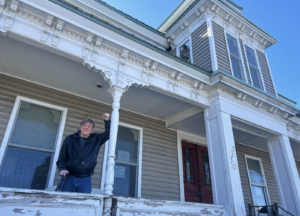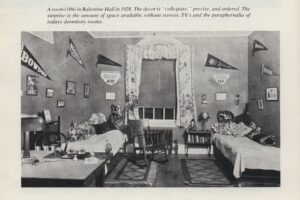The Women’s Resource Center was founded in 1991, with the mission of supporting women’s issues at the University of Maine and around the state. In the summer of 2015, the center was shut down due to budget cuts.
“They backed a moving truck up to the place and emptied it out,” Sharon Barker, the former director of the Women’s Resource Center, said.
Barker had been the director of the center since its inception, up until she retired a year ago. A University of Maine alumna, Barker is a longtime advocate of women’s rights. She co-founded the Mabel Wadsworth Women’s Health Center in Bangor, one of few independent feminist health centers in the United States.
“It was more of a catalyst organization,” Barker said. The center promoted an inclusive, positive and supportive environment for women’s personal and professional development at UMaine. It provided networking with women and women’s organizations throughout the state. The center brought together women with similar values and goals.
“Advocacy, I think, was one of the most important things that we did, as well as the connection with feminist women. I would refer students to other women on campus who had different expertise. It was that referral resource development,” Barker said.
UMaine’s Student Women’s Association (SWA) was based in the Women’s Resource Center. SWA is a progressive, feminist student organization. SWA used the space at the Center for meetings and storage.
Under Barker’s leadership, the Women’s Resource Center established and carried several projects. The center worked on reproductive rights, in collaboration with SWA. In addition to that, the center worked on recruiting and retaining female faculty members.
“We did a lot of work with administration around issues concerning women on campus. We did a lot of behind the scenes work that wasn’t necessarily credited to us, but we were a catalyst that brought attention to these issues,” Barker said.
One of the many initiatives of the enter included the annual Expanding Your Horizons program, a one-day conference on campus for middle school girls, designed to foster awareness of career opportunities in science, engineering, mathematics and technology.
“It wasn’t just a conference with workshops for little girls,” Barker said.
College students were trained to work with these girls around gender equity issues. The center also did professional development work with teachers who attended the conference.
Another significant project that the center worked on was the Safe Campus Project. The project worked to promote a safe campus by helping to reduce sexual assault, relationship abuse and stalking by stressing intervention and prevention. It also provided members of the UMaine community advocacy, support, educational resources related to sexual assault or abuse and offered a variety of options for people affected by assault or abuse.
The Safe Campus Project began in January 2001 with a $1 million, six-year grant from the U.S. Department of Justice and collaborating agencies. The grant was given to develop a program that improved victim services, address offender accountability and create initiatives that focused on domestic violence prevention and well-being. After the federal funding ended in 2007, the university moved the project into the Women’s Resource Center with continuing institutional funding. The Safe Campus Project also trained “responders” on campus — a number of employees trained to recognize signs of abuse among co-workers.
“The Safe Campus project was removed from the Center about five years ago, without any consultation, or discussion,” Barker said. The Safe Campus Project no longer exists at the university.
“I occasionally get feedback and calls from women in the community, saying they were was looking for a report on the Center’s website, but couldn’t look it up,” Barker said. “I had students that have contacted me asking for advice on how to get the Center back, but I just don’t think it’s a priority of campus, anymore. We no longer have the council on women, Safe Campus project and Women’s Health Services,” Barker said.
Women’s Health Services was located in the separate wing of Cutler Health Center. Modeled similarly to the Planned Parenthood program, Women’s Health Services provided services and peer education programs to women. It was disbanded 15 years ago.
“We are left with a fairly struggling and understaffed academic program [Women’s, Gender and Sexuality Studies]. Things are worse now than they were twenty years ago, because at least at that point, there were initiatives that tried to address these issues,” Barker said.
SWA is working to bring the Women’s Resource Center back. Sam Saucier, a member of SWA, thinks that phasing out was one of the reasons why the Center got shut down. After Barker retired, the center was run by graduate students who worked part-time.
“There was a decrease in value. People who worked there didn’t know they were losing their jobs, from my understanding. Women’s Gender Studies wasn’t informed either. They came back in fall and everything has been emptied out,” Saucier said.
Saucier is hopeful that the Center will come back. SWA is already coming up with new ideas for the Center’s curriculum. In addition to having programs for women, the Center provided Sexually Transmitted Infection (STI) testing, abortion care services and feminine hygiene products.
“We want women to know that they have that space. A space where they can get resources they need. A space where they feel safe, respected, accepted and wanted on this campus,” Saucier said. “Having a Women’s Resource Center isn’t a radical thing. We had one for over 20 years and countless other universities have them. This shouldn’t be a controversial ask, because we really feel that it is our right.”











